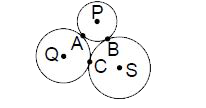यदि x, y परिमेय संख्याएँ हैं तब x, y के मान ज्ञात कीजिये
(x+y)+(x−2y)√2=2x−y+(x−y−1)√5
x = 1,y= 1 होगा।
x = 2,y=1 होगा।
x = 5, y = 1 होगा।
x एवं y के अनन्त मान हो सकते है।
The correct Answer is:B
Step by step video, text & image solution for यदि x, y परिमेय संख्याएँ हैं तब x, y के मान ज्ञात कीजिये (x+y)+(x-2y)sqrt(2)=2x-y+(x-y-1)sqrt(5) by Maths experts to help you in doubts & scoring excellent marks in Class 11 exams.
Updated on:21/07/2023Topper's Solved these Questions
- MATHEMATICS DPP NO. 08Book:RESONANCE HINDIChapter:MATHEMATICS DPP NO. 08Exercise:प्रश्न
Explore 5 Videos
- MATHEMATICS DPP NO. 07Book:RESONANCE HINDIChapter:MATHEMATICS DPP NO. 07Exercise:प्रश्न
Explore 2 Videos
- MATHEMATICS DPP NO. 24Book:RESONANCE HINDIChapter:MATHEMATICS DPP NO. 24Exercise:बहुविकल्पीय प्रश्न
Explore 8 Videos
Similar Questions
P,Q एवं S केन्द्र वाले वृत्त चित्रानुसार परस्पर बिन्दु A, B एवं C पर बाह्यतः स्पर्श करते हैं। यदि P,Q एवं S केन्द्र वाले वृत्तों की त्रिज्याएँ क्रमशः 1,2 व 3 है, तो जीवा AB की लम्बाई ____________ है

View Solutionनिम्न को 'पूर्ण वर्ग + कोई अचर' के रूप में बदलिए
(i) x2+x
(ii) x2+3x
View Solutionमाना y=ax2+bx+c के द्विघात व्यंजक है जिसका शीर्ष (3, -2) तथा c = 10 है , तब -
b का मान है -
View SolutionLet y=√x+√x+√x+∞ , dydx is equal to (a)12y−1 (b) xx+2y (c)1√1+4x (d) y2x+y
View SolutionIf y=√x+√y+√x+√y+∞,thenprovethatdydx=y2−x2y3−2xy−1
View SolutionIf y=sqrt(x+sqrt(y+sqrt(x+sqrt(y+...oo))) then ) prove that (dy)/(dx)=(y^(2)-x)/(2y^(3)-2xy-1)
View SolutionIf x, y are rational numbers such that (x+y)+(x−2y)√2=2x−y+(x−y−1)√5 then
View Solutionफलन y=f(x) के लिए यदि dydx=6(x−2)(x−3) है तो के ty अधिकतम मान के लिए का x मान ज्ञात कीजिये
View SolutionLet y=√x+√x+√x+∞ , dydx is equal to
(a)12y−1 (b) xx+2y (c)1√1+4x (d) y2x+y
View SolutionLet y=√x+√x+√x+∞ , dydx is equal to 12y−1 (b) xx+2y 1√1+4x (d) y2x+y
View SolutionIf y=√x+√y+√x+√y+...∞ then prove that dydx=y2−x2y3−2xy−1
View SolutionIf x, y are rational numbers such that (x+y)+(x−2y)√2=2x−y+(x−y−1)√5 then
View SolutionLet y=√x+√x+√x+∞ , dydx is equal to (a)12y−1 (b) xx+2y (c)1√1+4x (d) y2x+y
View SolutionIf x, y are rational numbers then find the value of x, y (x+y)+(x-2y)sqrt(2)=2x-y+(x-y-1)sqrt(5)
View SolutionIf x, y are rational numbers then find the value of x, y = (x+y)+(x-2y)sqrt(2)=2x-y+(x-y-1)sqrt(5)
View Solution